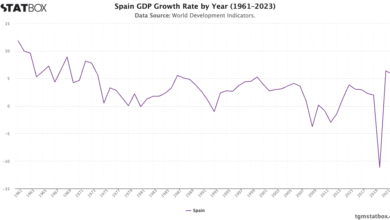Consumer Confidence Declines: March Economic Outlook

Consumer confidence is a critical indicator of the health of the economy, reflecting how optimistic or pessimistic consumers feel about future economic conditions. Recent reports from the Conference Board reveal that consumer confidence further declined in March, with the consumer confidence index dropping to its lowest point in over a decade. Economists previously estimated a slight increase, yet the results demonstrated an alarming decrease in sentiment, particularly concerning recession expectations. As consumers reassess their labor market perceptions, a significant drop in expectations about future conditions has raised concerns among policymakers and investors alike. This trend, highlighting the fragile nature of consumer psychology, could foreshadow more challenging times ahead for the economy.
The outlook on consumer sentiment plays a pivotal role in shaping economic trends and business cycles. Often referred to as the mood of the marketplace, this sentiment captures how individuals assess their financial health and their expectations for the future. Recently, the decreasing consumer confidence has sparked concerns over impending recessions, as the index signaling future economic developments hits a concerning low. Additionally, perceptions of the labor market are becoming more pessimistic, leading to a ripple effect that may hinder consumer spending. As a result, understanding these shifts in consumer attitudes is essential for predicting economic fluctuations and preparing for potential downturns.
Understanding the Decline in Consumer Confidence
The recent decline in consumer confidence, highlighted by the Conference Board’s report, demonstrates the growing anxiety among consumers regarding the current economic outlook. March’s confidence index has dropped to 92.9, a significant decrease from previous months and reflecting an ongoing trend of pessimism among consumers. This contraction is not merely a fleeting moment; it reveals deeper concerns pertaining to the labor market perceptions and income stability. With an index reading that has now fallen for four consecutive months, implications for future economic conditions become increasingly concerning.
This decline can be linked to rising fears around recession expectations, primarily driven by decreased optimism about job opportunities and income growth. Historically, when consumer confidence dips below certain thresholds, as it has in this case, the likelihood of economic downturns rises. As parents and households tighten their budgets in response to these negative perceptions, businesses may also feel the impact, potentially leading to further economic slowdowns. Understanding the factors that contribute to this decline will be crucial for policymakers aiming to restore consumer confidence and improve the broader economic landscape.
Impacts of Consumer Confidence on Economic Conditions
Consumer confidence plays a pivotal role in shaping the economic landscape. When consumers express optimism regarding future economic conditions, they are more likely to increase their spending, which in turn boosts business revenues and stimulates job creation. However, the slump we are witnessing, with the expectations for future conditions plummeting to the lowest level in over a decade, could signal a shift in consumer behavior that may negatively affect economic growth. As individuals rein in their expenditures, overall demand in the economy may wane, posing greater challenges to sectors heavily reliant on consumer spending.
The current findings reveal that consumers’ optimism regarding their financial futures has significantly diminished, which could pressure firms to reconsider hiring strategies amid a faltering labor market perception. A declining consumer confidence index often serves as an early indicator of a potential recession; therefore, stakeholders must watch these metrics closely. Different sectors could be impacted in varied ways, depending on consumer sentiment and spending habits. Thus, cultivating a positive outlook among consumers is vital for rejuvenating the economic conditions.
Consumer Confidence Index: A Key Economic Indicator
The consumer confidence index is a crucial economic indicator that provides insights into how households feel about their financial situation and the overall economic climate. The recent findings, which reveal a significant drop to 65.2 for future expectations, suggest that many individuals are apprehensive about their economic prospects. This index is not only a reflection of personal sentiment; it also serves as a leading indicator for consumption patterns, which drive economic growth. Such a stark decline signals potential challenges that could hinder recovery efforts.
Additionally, the correlation between consumer confidence and macroeconomic factors such as inflation, unemployment rates, and global economic shifts cannot be understated. As confidence wanes, consumer spending, which contributes to GDP, is likely to shrink, affecting multiple industries. Economic policymakers may need to implement measures aimed at boosting this index, such as targeted fiscal policies or support for job creation initiatives, to foster an environment where consumer confidence can thrive once more.
Labor Market Perceptions and Their Influence on Consumer Trust
Labor market perceptions play a significant role in shaping consumer confidence, as seen in the recent reports. A sense of job security and favorable employment prospects are critical components of consumer optimism. With the present decline in the index, it is evident that a majority of respondents are losing faith in the labor market’s ability to provide stable jobs and growth opportunities. This decline affects not only the overall consumer confidence index but also influences how consumers plan their spending, saving, and investment decisions.
When consumers sense that job opportunities are limited and economic conditions are uncertain, they are less likely to make significant purchases or investments. This cautious approach can result in a ripple effect throughout the economy, potentially slowing down growth and exacerbating recession expectations. To strengthen consumer trust, it may be vital for businesses and governments to take proactive steps to improve job security and create a more favorable labor market that instills confidence in consumers.
Economic Outlook: Implications for Policymakers
The recent downturn in consumer confidence holds significant implications for policymakers and economic planners. As the confidence index declines, there is a clear indication that consumers are adjusting their behavior in anticipation of tougher economic conditions. The drop of 9.6 points in the future expectations index reflects a profound sentiment that could hinder potential economic recovery efforts. Economists and leaders must consider these findings when crafting economic strategies, as a lack of consumer spending could stifle growth and job creation.
To counteract this decline, policymakers may need to focus on improving economic conditions through a variety of measures, including stimulus packages, support for small businesses, and initiatives aimed at enhancing job creation. Creating a stable economic environment would not only help restore consumer confidence but also encourage greater spending and investment, leading to a more robust economic outlook moving forward. Collaboration between economic stakeholders is essential in addressing these challenges and fostering a resilient economic environment.
Recession Expectations and Consumer Response
The prevailing recession expectations have created a ripple effect across consumer behavior and sentiment. With the consumer confidence index falling to alarming levels, many households are bracing for tougher economic times. This anxiety can lead to reduced spending, as consumers prioritize saving over expenditures in preparation for possible economic hardships. The current sentiment can create a self-fulfilling prophecy, wherein decreased spending contributes to economic slowdowns, further validating the initial fears surrounding a recession.
Understanding the psychology behind consumer behavior in context of these recession expectations is essential for businesses and policymakers alike. Individuals may be influenced more by perceived economic threats than by actual conditions, leading to significant shifts in spending habits. It’s crucial for economic leaders to mitigate these fears through transparent communication and targeted economic policies aimed at fostering optimism and correcting negative trends in consumer confidence.
Future Economic Conditions: The Road Ahead
The current decline in consumer confidence raises questions about future economic conditions. As expectations plummet, many consumers are reassessing their financial situations and attitudes toward spending. The challenge for economists and business leaders is to understand how these shifts can impact broader economic trends. With consumer sentiment closely tied to economic performance, a continuation of this decline could spell difficulties for growth and recovery in various sectors.
To navigate the challenges posed by deteriorating consumer confidence, it is imperative to implement strategies that focus on restoring optimism about the economy’s future. Initiatives that enhance job creation, promote income growth, and improve labor market perceptions could help shift consumer attitudes positively. If consumers regain confidence in the economy, it could pave the way for increased spending and investment, contributing to a more favorable economic environment moving forward.
Restoring Consumer Confidence: Strategies and Solutions
Restoring consumer confidence should be a priority for policymakers and business leaders in light of recent declines. There are several strategies that can be implemented to uplift consumer sentiment, including targeted economic reforms, public outreach, and educational campaigns designed to inform consumers about economic opportunities. Enhancing transparency in job markets and providing support structures for job transitions can also play a pivotal role in alleviating fears, thereby restoring consumer trust.
Additionally, promoting financial literacy among consumers can empower individuals to make informed decisions, ultimately boosting their confidence in future economic conditions. Collaborative efforts between government and private sectors to offer workshops or resources aimed at improving personal finance management can help re-establish a sense of security amongst consumers. By investing in solutions that actively address concerns and uncertainties, a pathway to restoring consumer confidence can be forged, leading to revitalized economic growth.
Frequently Asked Questions
What is the Consumer Confidence Index and why is it important for understanding economic outlook?
The Consumer Confidence Index (CCI) is a key indicator that measures how optimistic or pessimistic consumers are regarding their expected financial situation and the overall economic outlook. It plays a crucial role in gauging economic activity, as higher consumer confidence typically leads to increased spending, which fuels economic growth. Conversely, a decline in the CCI can signal reduced spending and economic slowdown.
How do recession expectations affect consumer confidence?
Recession expectations have a significant impact on consumer confidence. When consumers anticipate a recession, their confidence tends to decline, leading to reduced spending and increased saving. This can create a self-fulfilling prophecy, where decreased consumer spending contributes to an actual economic downturn, further impacting consumer sentiment negatively.
What do recent trends in the Consumer Confidence Index indicate about future economic conditions?
Recent trends indicate a worrying decline in the Consumer Confidence Index, with the index for future expectations dropping to its lowest level in over a decade. This suggests that consumers foresee challenging economic conditions ahead, including potential job losses and decreased income, which can stifle overall economic growth and assure economic instability.
How do labor market perceptions influence consumer confidence?
Labor market perceptions are integral to consumer confidence. If consumers feel secure in their jobs and believe the labor market is stable, they are more likely to express confidence in their economic outlook and spend accordingly. Conversely, rising unemployment or negative perceptions about job opportunities can severely weaken consumer confidence, as seen in recent reports reflecting the lowest consumer outlook in years.
Why did the Consumer Confidence Index fall in March, according to recent reports?
The Consumer Confidence Index fell in March largely due to heightened concerns about future economic conditions, leading to decreased optimism about job opportunities and income stability. This decline of 9.6 points in future expectations, marking the lowest level in over a decade, highlights how rapidly changing economic factors and labor market perceptions can significantly influence consumer sentiment.
How can businesses respond to changes in consumer confidence?
Businesses can adapt to changes in consumer confidence by closely monitoring the Consumer Confidence Index and adjusting their marketing strategies and pricing models accordingly. During periods of declining consumer confidence, companies may focus on value offerings, enhance customer engagement, and invest in building brand loyalty to mitigate the impacts of reduced consumer spending.
| Key Point | Details |
|---|---|
| Consumer Confidence Decline | Consumer confidence declined in March, with a significant drop in expectations for future economic conditions. |
| Confidence Index | The current conditions confidence index fell to 92.9, a reduction of 7.2 points. |
| Future Expectations Index | The index for future expectations dropped to 65.2, the lowest in 12 years, indicating a recession risk. |
| Economic Outlook | Consumer optimism regarding future income and employment opportunities has sharply decreased. |
| Expert Commentary | Stephanie Guichard from The Conference Board highlighted shifting consumer perceptions influenced by economic concerns. |
Summary
Consumer confidence has seen a notable decline as of March, reflecting growing unease regarding the economy and labor market. This downturn is significant as it suggests that consumers are becoming increasingly pessimistic about their financial future, which can have broader implications for economic growth. With the future expectations index plummeting to a 12-year low, understanding these trends in consumer confidence is essential for anticipating potential shifts in market conditions.



